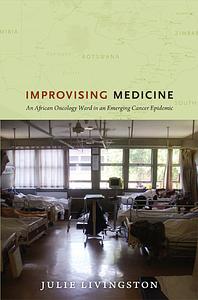You need to sign in or sign up before continuing.
Take a photo of a barcode or cover
9 reviews for:
Improvising Medicine: An African Oncology Ward in an Emerging Cancer Epidemic
Julie Livingston
9 reviews for:
Improvising Medicine: An African Oncology Ward in an Emerging Cancer Epidemic
Julie Livingston
A heart-wrenching, amazingly well-written and well-documented book, that is just as gripping a read as any novel, despite being non-fiction.
A must read for anyone working in healthcare and/or in the cooperation sector.
A must read for anyone working in healthcare and/or in the cooperation sector.
This book was so inspiring that I feel suddenly motivated to create a new tag chronicling my reading adventures ("forced-reading" OR "i-cannot-believe-i-had-to-read-this" OR something equally synonymous), to admit I'm beginning to see ethnographies together as what makes up one of the most boring genres of literature (second only to romance), and apparently to not feel abashed using run-on sentences with improper punctuation and occasionally words that make it seem like I am overly dependent on a thesaurus to deliver a moot point in order to convey the emotion of dismay.
challenging
emotional
informative
slow-paced
challenging
emotional
informative
slow-paced
Don't let the <300 page detail fool you. This is a very well-considered book that carefully weighs the unique challenges that complicate oncological care in a public hospital in Botswana.
Graphic: Cancer, Death, Grief
Really intense, interesting look at a (the) cancer ward in Botswana. Some similar themes to [b:A Heart for the Work|10137617|A Heart for the Work Journeys through an African Medical School|Claire L. Wendland|https://d.gr-assets.com/books/1347937684s/10137617.jpg|15035645], which Livingston cites -- thinking about things like inadequacy of supplies, care being sought and/or provided too late... There's a really lovely moment when a nurse talks about cleaning out a wound: I just said, 'OK, before you assign me to that I want to come and take a look, to know what to expect under that bandage.' So I looked while someone else was cleaning, and I said, 'OK, now I've seen it.' No surprises the next day, when it was my turn, Mma D assisted me, and it was fine (110). I just love how practical that is -- what a great recognition, one, that nurses and doctors are only human too, and then two, what a compassionate scene. Wendland works a lot of those in here.
I didn't take as many notes here as I did with A Heart for the Work, and those I did tended to be scenes of that sort:
Afterward, he [the three-year-old patient] is crying and screaming and lying on the table and demanding his banana [given to him by the doctor]: "Ke kopa banana ya me, banana, banana!" His mother gets up and brings it to him. Dr. P is happy that he wants to eat his banana now, feeling certain that this will calm him down, and terribly proud that he has thought to give him a piece of fruit. As Dr. P turns his back to empty the syringes onto the slides, the boy comes up behind him and throws the banana at Sr. P's bum with all his might. Everyone collapses to the ground in laughter. (146)
But there are also a lot of harder things here, like who, when resources are so limited, get those resources. Do you give a bed to the patient with terminal cancer, who is critically ill and deserves care and will die in a few months anyway -- but might survive longer, and more comfortably, in hospital? Or do you give the bed to someone whose symptoms are less severe (and who also deserves care), and who might have better support, but whose chances are better and might benefit from hospital care?
So lots of questions and few concrete answers, which seems just as it should be.
Interesting things in the references: [b:Vita|43957|Vita Life in a Zone of Social Abandonment|João Biehl|https://d.gr-assets.com/books/1347785255s/43957.jpg|43333], [b:Forgive and Remember|35342|Forgive and Remember Managing Medical Failure|Charles L. Bosk|https://d.gr-assets.com/books/1328874437s/35342.jpg|35277], [b:Stories in the Time of Cholera|70920|Stories in the Time of Cholera Racial Profiling during a Medical Nightmare|Charles L. Briggs|https://d.gr-assets.com/books/1386922728s/70920.jpg|68715], [b:When Bodies Remember|35364|When Bodies Remember Experiences and Politics of AIDS in South Africa|Didier Fassin|https://d.gr-assets.com/books/1389726791s/35364.jpg|35299], [b:Voting with Their Feet|7211307|Voting with Their Feet Migrant Zimbabwean Nurses and Doctors in the Era of Structural Adjustment, Research Report 111|Rudo Gaidzanwa|https://s.gr-assets.com/assets/nophoto/book/50x75-4845f44723bc5d3a9ac322f99b110b1d.png|7952698], [b:East African Doctors|1142532|East African Doctors A History of the Modern Profession|John Iliffe|https://d.gr-assets.com/books/1347839089s/1142532.jpg|1129956], [b:The Quest for Therapy in Lower Zaire|652255|The Quest for Therapy in Lower Zaire|John M. Janzen|https://d.gr-assets.com/books/1348518678s/652255.jpg|638366], [b:And a Time to Die|317507|And a Time to Die How American Hospitals Shape the End of Life|Sharon R. Kaufman|https://d.gr-assets.com/books/1348596189s/317507.jpg|308310], [b:Cinderella's Sisters|209641|Cinderella's Sisters A Revisionist History of Footbinding|Dorothy Ko|https://d.gr-assets.com/books/1348929905s/209641.jpg|202906], [b:Divining Without Seeds|10727576|Divining Without Seeds The Case for Strengthening Laboratory Medicine in Africa|Iruka N. Okeke|https://d.gr-assets.com/books/1349016759s/10727576.jpg|15638371], [b:When Experiments Travel|6476680|When Experiments Travel Clinical Trials and the Global Search for Human Subjects|Adriana Petryna|https://d.gr-assets.com/books/1348556061s/6476680.jpg|6667877], [b:The Story of an African Famine|1356022|The Story of an African Famine Gender and Famine in Twentieth-Century Malawi|Megan Vaughan|https://d.gr-assets.com/books/1348359754s/1356022.jpg|1345740]
I didn't take as many notes here as I did with A Heart for the Work, and those I did tended to be scenes of that sort:
Afterward, he [the three-year-old patient] is crying and screaming and lying on the table and demanding his banana [given to him by the doctor]: "Ke kopa banana ya me, banana, banana!" His mother gets up and brings it to him. Dr. P is happy that he wants to eat his banana now, feeling certain that this will calm him down, and terribly proud that he has thought to give him a piece of fruit. As Dr. P turns his back to empty the syringes onto the slides, the boy comes up behind him and throws the banana at Sr. P's bum with all his might. Everyone collapses to the ground in laughter. (146)
But there are also a lot of harder things here, like who, when resources are so limited, get those resources. Do you give a bed to the patient with terminal cancer, who is critically ill and deserves care and will die in a few months anyway -- but might survive longer, and more comfortably, in hospital? Or do you give the bed to someone whose symptoms are less severe (and who also deserves care), and who might have better support, but whose chances are better and might benefit from hospital care?
So lots of questions and few concrete answers, which seems just as it should be.
Interesting things in the references: [b:Vita|43957|Vita Life in a Zone of Social Abandonment|João Biehl|https://d.gr-assets.com/books/1347785255s/43957.jpg|43333], [b:Forgive and Remember|35342|Forgive and Remember Managing Medical Failure|Charles L. Bosk|https://d.gr-assets.com/books/1328874437s/35342.jpg|35277], [b:Stories in the Time of Cholera|70920|Stories in the Time of Cholera Racial Profiling during a Medical Nightmare|Charles L. Briggs|https://d.gr-assets.com/books/1386922728s/70920.jpg|68715], [b:When Bodies Remember|35364|When Bodies Remember Experiences and Politics of AIDS in South Africa|Didier Fassin|https://d.gr-assets.com/books/1389726791s/35364.jpg|35299], [b:Voting with Their Feet|7211307|Voting with Their Feet Migrant Zimbabwean Nurses and Doctors in the Era of Structural Adjustment, Research Report 111|Rudo Gaidzanwa|https://s.gr-assets.com/assets/nophoto/book/50x75-4845f44723bc5d3a9ac322f99b110b1d.png|7952698], [b:East African Doctors|1142532|East African Doctors A History of the Modern Profession|John Iliffe|https://d.gr-assets.com/books/1347839089s/1142532.jpg|1129956], [b:The Quest for Therapy in Lower Zaire|652255|The Quest for Therapy in Lower Zaire|John M. Janzen|https://d.gr-assets.com/books/1348518678s/652255.jpg|638366], [b:And a Time to Die|317507|And a Time to Die How American Hospitals Shape the End of Life|Sharon R. Kaufman|https://d.gr-assets.com/books/1348596189s/317507.jpg|308310], [b:Cinderella's Sisters|209641|Cinderella's Sisters A Revisionist History of Footbinding|Dorothy Ko|https://d.gr-assets.com/books/1348929905s/209641.jpg|202906], [b:Divining Without Seeds|10727576|Divining Without Seeds The Case for Strengthening Laboratory Medicine in Africa|Iruka N. Okeke|https://d.gr-assets.com/books/1349016759s/10727576.jpg|15638371], [b:When Experiments Travel|6476680|When Experiments Travel Clinical Trials and the Global Search for Human Subjects|Adriana Petryna|https://d.gr-assets.com/books/1348556061s/6476680.jpg|6667877], [b:The Story of an African Famine|1356022|The Story of an African Famine Gender and Famine in Twentieth-Century Malawi|Megan Vaughan|https://d.gr-assets.com/books/1348359754s/1356022.jpg|1345740]
informative
reflective
Graphic: Cancer, Chronic illness, Terminal illness, Medical content, Injury/Injury detail
Moderate: Vomit
For an anthropological study, Livingston's writing offers a surprisingly approachable and deeply human look at the PMH Oncology Ward in Botswana. I was really moved by some of the scenes, examples, and ethical issues she raises, even with the difficulties also posed by her status as an outsider-researcher. Though emotionally difficult, I think this is worth reading.






